The Universal Periodic Review (UPR) is a unique process that involves a periodic review of the human rights records of all 193 UN Member States. The process provides an opportunity for all States to review what progress on human rights has been achieved by each country, and to give recommendations on what improvements they wish to see.
In January 2024 China’s 4th UPR took place and they faced an unprecedented challenge to its human rights violations in Tibet.
20 UN Member States used China’s UPR to raise concerns about the deteriorating human rights situation in Tibet, making 24 uncompromising recommendations on Tibet.
Among governments’ recommendations to China were that it end the residential boarding school system in Tibet; to end forced labour and coercive labour transfer in Tibet; to grant the UN full and unfettered access to Tibet; to guarantee access to Tibetan language education [in every aspect of their schooling]; and to respect the rights to freedom of religion, or belief, opinion, and expression, peaceful assembly and culture in Tibet.
The rise in governments raising Tibet has increased two-fold since China’s last UPR in 2018 and is up almost five-fold since China’s first UPR in 2009, signalling the severe worsening of the human rights situation on the ground, as China continues to deny independent UN human rights monitors access to the country.
2024 RECOMMENDATIONS:
AUSTRALIA (1)
- Repeal legislation and cease practices that discriminate against Tibetans and Uyghurs on the basis of race or religion; cease arbitrary detention, coercive labour transfer and family separation programs; and end restrictions on movement and on rights to enjoy their own culture and language, consistent with the OHCHR and other treaty body reports on Xinjiang and Tibet.
AUSTRIA (2)
- Repeal policies to forcibly assimilate Tibetan and Uyghur people culturally, religiously and linguistically, abolish Chinese-language boarding school systems for Tibetan and Uyghur pupils and ensure their right to education without discrimination, family life and cultural rights.
BELGIUM (1) [New State]
- Respond positively to outstanding requests for visits of special procedures, including to Tibet and Xinjiang, particularly those working on slavery, counterterrorism, religion or belief, and business and human rights.
CANADA (2)
- Implement the recommendations set out by the Committee on Economic, Social and Cultural Rights and the Committee on the Elimination of Discrimination against Women, and end all coercive measures imposed on Uyghurs, Tibetans, and other ethnic minorities, including forced labour, coercive labour transfers, forced sterilizations, and mandatory residential schools.
- Grant the UN, including the OHCHR and special procedures, full and unfettered access to all regions of China, including Tibet and Xinjiang.
CZECH REPUBLIC (1)
- End the criminalization of religious and peaceful civil expression by ethnic and ethno-religious groups, including Muslim Uyghurs and Buddhist Tibetans and Mongolians, under the pretext of protecting state security.
DENMARK (1)
1. Immediately abolish coerced residential school systems imposed on Tibetan children and ensure that persons belonging to minorities can fully enjoy their cultural rights and use their own language.
ESTONIA (1) [New State]
- Respect and ensure the rights of persons belonging to ethnic and religious minorities, in particular in Xinjiang and Tibet
FRANCE (1)
- Guarantee the protection of freedom of religion, particularly for Uyghur and Tibetan people
GERMANY (1)
- Respect the right of persons belonging to ethnic and religious minorities, including in Xinjiang and Tibet
JAPAN(1) [New State]
- Protect the rights of minorities, including the Tibetans and Uighurs, including their rights to enjoy their cultural and religious practices as recommended by the Committee on Economic, Social and Cultural Rights.
LITHUANIA (2) [New State]
- Ensure that children in all regions, including Tibetan children, are guaranteed the right to use their language in every aspect of their schooling.
- Guarantee the right of all citizens to opinion and expression without fear of reprisals and censorship in all regions, including Hong Kong, Tibet, and others.
NETHERLANDS(1)
- Abolish the de-facto coercive residential boarding and pre-school system in Tibet and guarantee access to Tibetan language education.
NEW ZEALAND (1)
- Implement the 2023 recommendations by the Committee on Economic, Social and Cultural Rights and the Committee on the Elimination of All Forms of Discrimination against Women on the right to freedom of thought, conscience and religion by ethnic and religious minorities including ethnic Uyghurs and Tibetans.
NORWAY (1) [New State]
- Allow unhindered access to UN special rapporteurs and independent experts to evaluate persistent reports of violations of human rights in China, including in Xinjiang and Tibet.
POLAND (1) [New State]
- Respect the rights to freedom of religion or belief, opinion and expression, peaceful assembly and culture, including for Tibetans, Uighurs and other minorities.
SWEDEN (1)
- Take urgent steps to fully respect the rights of ethnic and religious minorities, especially in Xinjiang and Tibet.
SWITZERLAND (1) [New State]
- Strengthen the protection of Tibetan culture and language in the compulsory education system and authorize the creation of private Tibetan schools.
UNITED KINGDOM (1)
- Cease the persecution and arbitrary detention of Uyghurs and Tibetans, and allow genuine freedom of religion or belief and cultural expression without fear of surveillance, torture, forced labour, or sexual violence, and implement OHCHR recommendations on Xinjiang.
UNITED STATES OF AMERICA (3)
- Cease harassment, surveillance, and threats against individuals abroad and in China, including Xinjiang, Tibet and Hong Kong.
2. Cease discrimination against individuals’ culture, language, religion or belief, end forcible assimilation policies, including boarding schools, in Tibet and Xinjiang.
3. Permit the UN unhindered and meaningful access particularly in Xinjiang and Tibet
2024 Mentions
IRELAND (1) [New State]
“Ireland is deeply concerned about the continued repression of civil society in China, including harassment of human rights defenders, restrictions on freedom of expression, including in Hong Kong and the treatment of ethnic and religious groups, including in Xinjiang and Tibet.”
MONTENEGRO (1) [New State]
“[S]erious human rights violations have been committed in the context of the government’s strategies to fight terrorism and extremism, in particular in Xinjiang and Tibet”
2024 Advanced Questions:
AUSTRALIA:
- Australia remains deeply concerned about ongoing restrictions on religious freedom, freedom of movement and the suppression of linguistic freedoms in Xinjiang and Tibet. Australia is deeply concerned about reports detailing China’s assimilationist policies, including forced labour transfer programs and the coerced separation of Tibetan children from their families through state-run boarding schools. What is China doing to address these concerns and will China allow meaningful and unfettered access to Xinjiang and Tibet for independent human rights observers, including the UN High Commissioner for Human Rights and Special Procedures mandate holders?
AUSTRIA;
- During China’s 2018 UPR, the Government accepted a recommendation that it would “Facilitate the visits of the UN High Commissioner and the Special Procedures including to Tibetan and Uighur areas”. Since then, neither the UN High Commissioner for Human Rights nor any Special Procedure mandate holders have been granted access to Tibet. When will the Government uphold its commitment to facilitate this access?
BELGIUM:
- Will the government of the People’s Republic of China strengthen its cooperation with the UN Special Procedures, by issuing a standing invitation to the Special Procedures and by responding positively to outstanding requests of Special Procedures to visit the country, including to Tibet, Xinjiang and Hong Kong?
- Which measures will the government of China take to ensure the fully enjoyment by minorities of their right to enjoy their own cultural identity and take part in cultural life, and to abolish the coerced residential (boarding) school system imposed on Tibetan children, as recommended by the CESCR Committee? (Belgium)
GERMANY:
- What is the percentage of Tibetan children currently schooled in the boarding school system in the Tibetan regions? Do the families have a choice whether or not to send their children to boarding school? What are the consequences for those who choose not to send their children to boarding school? How is the Tibetan language being taught in these schools?
- What is the current situation of nine Tibetan environmental human rights defenders, namely Anya Sengdra, Dorjee Daktal, Kelsang Choklang, Dhongye, Rinchen Namdol, Tsultrim Gonpo, Jangchup Ngodup, Sogru Abhu and Namesy, addressed by UN experts in August 2023, who were all sentenced to between 7 and 11 years of prison between 2010 and 2019?
- What steps is China taking to provide freedom of religion or belief for all, amongst others by non-discriminating and non-interfering into religious education and practice as must be stated inter alia in the cases of Tibetan Buddhists and Uyghur Muslims?
CUBA:
- What measures has the Chinese government taken to ensure the equal right of Tibetan people to education? What are the effective ways to overcome the difficulties of natural conditions and sparse population? 5. As it is pointed out in the Report to the 20th National Congress of the Communist Party of China, China is advancing the Healthy China Initiative. Could you please share some good practices?
NETHERLANDS:
- Will the Government implement the Concluding Observations of the Committee on Economic, Social and Cultural Rights of February 2023 and the Committee on the Elimination of Discrimination against Women of May 2023 to immediately abolish the coerced residential school system imposed on Tibetan children and allow private Tibetan schools to be (re) established?
- What are the considerations for the Government of China to continue to require special permission for foreigners, including journalists and diplomats based in China, to visit the Tibetan Autonomous Region?
SWEDEN:
- How is the Government of the PRC addressing the recommendations contained in the OHCHR Assessment Report of the Human Rights Concerns in Xinjiang Uyghur Autonomous Region (XUAR) and other communications by UN special procedures expressing concern over human rights violations committed in XUAR, in Tibet Autonomous Region and against Tibetans in other regions?
SWITZERLAND:
- Will the Chinese Government adhere to internationally recognized standards to protect freedom of religion or belief by refraining from interfering with the Tibetan people’s right to choose its own clergy, including on the next Dalai Lama?
- What is the Chinese Government’s reaction to the concerns expressed by United Nations Special Rapporteurs in November 2022 regarding what they termed “a policy of acculturation and assimilation of the Tibetan culture into the dominant Han Chinese majority”?
UNITED KINGDOM:
- What steps is the Government taking to ensure that the right to freedom of religion or belief is respected and protected for members of all religious and ethnic groups in China, including Muslim-majority ethnic groups in Xinjiang, Tibetan Buddhists including Gedhun Choekyi Nyima and Go Sherab Gyatso, and other religious groups including Christians such as Pastors Wang Yi and Zhang Chunlei?
- Noting that China has now ratified the ILO’s Forced Labor Convention 1930 (No. 29) and the Abolition of Forced Labor Convention 1957 (No. 105), when will the Government take concrete steps to ensure that the use of forced labour is eliminated in Xinjiang, Tibet, and elsewhere in China, including by ratifying the 2014 protocol?
UNITED STATES OF AMERICA:
- What is the location and status of the following non-exhaustive list of individuals? We have raised these cases, including in the State Department’s 2022 Human Rights Report and in public statements: Yang Maodong (pen name Guo Feixiong); Uyghur scholars Ilham Tohti, Rahile Dawut, and Hushtar Isa; retired Uyghur medical doctor Gulshan Abbas; Uyghur entrepreneur Ekpar Asat; Tibetan Buddhist monk Go Sherab Gyatso; Tibetan Dorje Tashi; activists Wang Bingzhang, Chen Jianfang, and Huang Qi; pastors Zhang Shaojie and Wang Yi; Falun Gong practitioner Bian Lichao; Catholic Auxiliary Bishop of Shanghai Thaddeus Ma Daqin; rights lawyers Xia Lin, Gao Zhisheng, Xu Zhiyong, Ding Jiaxi, Tang Jitian, Chang Weiping, and Li Yuhan; blogger Wu Gan; citizen journalist Zhang Zhan; Shanghai labor activist Jiang Cunde; and The 11th Panchen Lama Gendhun Choekyi Nyima.
- Will China state publicly and unequivocally that it will not interfere with Tibetans’ ability to choose their religious and spiritual leaders, including the next Dalai Lama?
- Will China cease the abuse of counter-terrorism and so-called “de-extremification” laws to repress individuals for expressing their beliefs and cultural identity – including Uyghurs, Tibetans, Mongolians, and members of other ethnic and religious minority groups – as called for by the Office of the UN High Commissioner for Human Rights (2022), UN Committee on the Elimination of Racial Discrimination (2018), and UN Committee on Economic, Social, and Cultural Rights (2023)?
- The targeting of Uyghurs, who are predominantly Muslim, and members of other ethnic and religious minority groups in Xinjiang, for the prevention of births through forced birth control, involuntary sterilization, and forced abortion, and the removal of children from their families and placing them in state-run boarding schools indicate acts of genocide. Calls for action by the Committee on the Elimination of Racial Discrimination (2022) and the OHCHR (2022) highlight these acts as well. We are also concerned about cultural and religious repression and child separation policies in Tibet. In the next UPR Cycle, how will China work to uphold its obligations under the Genocide Convention to prevent and punish acts of genocide, and prevent and respond to instances of gender-based violence against women, particularly those who are members of ethnic and religious minority groups, under its Convention on the Elimination of All Forms of Discrimination Against Women (CEDAW) and CERD obligations?
- Development projects in Tibet that damage ecosystems and degrade natural resources and water security, and that result in the forcible relocation and resettlement of members of nomadic populations, affect these persons’ economic, social, and cultural rights under ICESCR and protections against discrimination under CERD. Will China stop these destructive actions and ensure genuine inclusion and participation by local communities for sustainable development, including in UNESCO heritage areas?
- Multiple UN human rights mechanisms have issued key findings, concerns, and recommendations, including the UN Human Rights Committee (2022), on the implementation of the ICCPR in Hong Kong and Macao; the UN Committee on Economic, Social, and Cultural Rights (2023); the UN Committee on the Elimination of Discrimination against Women (2023); the UN Working Group on Arbitrary Detention (2023) for China, including Hong Kong and Macao; and the UN Working Group on Business and Human Rights, regarding forced labor of Uyghurs and members of other ethnic and religious minority groups. The Office of the High Commissioner for Human Rights issued a report on Xinjiang (2022) and numerous UN special procedures mechanisms have raised concerns about human rights abuses across China. Will the governments of China, Hong Kong, and Macao accept the recommendations made by these mechanisms and, if so, what is the timeline for implementation? Will China provide unhindered access to Xinjiang and Tibet as requested by UN agencies and mandate holders?
2018 RECOMMENDATIONS:
AUSTRALIA:
- Cease restrictions on Uyghurs’ and Tibetans’ freedom of movement
- Allow media, UN, and foreign officials access to Xinjiang and Tibet
CANADA:
- End prosecution and persecution on basis of religion or belief including for Muslims, Christians, Tibetan Buddhists and Falun Gong
DENMARK:
- Denmark recommends the Government to facilitate full access to Xinjiang and Tibet for all relevant UN special procedures.
FRANCE:
- Recommend guaranteeing Freedom of religion and belief including in Tibet and Xinjiang
GERMANY:
- Respect rights of freedom of freedom of religion and belief, opinion and expression, peaceful assembly and culture also for Tibetans, Uyghurs and other minorities
NEW ZEALAND:
- Respect, protect and fulfill the right to freedom of thought, conscious and religion in accordance with general comment 22 of the HRC (HR Committee). To this end New Zealand recommends that China resume the two-way dialogue on Tibet
SWEDEN:
- Take urgent steps to respect the rights of persons belonging to ethnic minorities including the rights to peaceful assembly, to manifest religion and culture, in particular in Xinjiang and Tibet
SWITZERLAND:
- China should respect all HR of the Tibetan people and other minorities including the importance of a safe, clean, healthy and sustainable environment which is vital for the enjoyment of a number of these rights
UNITED STATES:
- Release those imprisoned for such [rights defence] work, including Tashi Wangchuk, Ilham Tohti, Huang Qi and Wang Quangzhang.
- Cease interference in the selection and education of religious leaders – including the reincarnation of Tibetan buddhist lamas.
2018 MENTIONS :
ICELAND: Iceland strongly encourages China to facilitate the access of Special Rapporteurs on various human rights issues in Tibetan areas
JAPAN: Human rights and fundamental freedoms must be ensured for minority groups such as Tibetans and Uyghurs.
POLAND: Poland notes the joint communications of eight Special Procedures with regard to alleged systematic attempts to undermine the rights to freedom of religion, culture, and expression of the Tibetan Buddhist community.
UK: We also remain concerned about the human rights situation in ethnic minority areas including Tibet and Xinjiang in particular with respect to the protection of cultural rights and religious freedoms.
ADVANCED QUESTIONS 2018:
AUSTRIA: Reports by UN bodies have highlighted concerns with regard the discrimination of ethnic minorities including in the Autonomous Region of Tibet, of Xinjiang and of Inner Mongolia. Mass internment of Uighurs in the Autonomous Region of Xinjiang is particularly alarming and we have taken note of explanations given by the authorities. What procedural guarantees are available for the concerned persons in particular regarding their access to remedy and the possibility for a review by independent judges on the lawfulness of the detention?
BELGIUM: The CERD committee expressed concern about the treatment of ethnic minorities in Tibet and Xinjiang, in particular the use of re-education camps. Which steps is the People’s Republic of China taking to address these concerns?
GERMANY: Will China commit to receiving UN Special Procedures and allow them unhindered access, including to areas home to Muslim ethnicities like the Uyghurs, Kazakhs and Kyrgyz as well as Tibetans to investigate allegations of mass detention, and severe restrictions of the rights to freedom of religion and belief, opinion and expression, peaceful assembly, association, movement, culture, and a fair trial?
SWEDEN: How, and what is the timeline for the Government of the PRC to implement the recommendations made by UN CERD including with regard to Tibet and Xinjiang?
SWITZERLAND: We are particularly pleased by China’s acceptance of our recommendation during the second cycle regarding the visit of the UN High Commissioner for Human Rights to the Tibetan Autonomous Region and to the Xinjiang Uyghur Autonomous Region. What steps have you taken with the new High Commissioner to implement this recommendation without restrictions? What is the status of the other outstanding requests from other UN mandate holders?
UNITED KINGDOM:
1. What steps is the Government taking to ensure that freedom of religion or belief, freedom of movement, and cultural rights are respected and protected for all religious and ethnic groups in China, particularly those in Tibet?
2. What steps is the Government taking to ensure that lawyers, activists, journalists and human rights defenders including Wang Quanzhang, Yu Wensheng, Jiang Tianyong, Li Yuhan, Gao Zhisheng, Tashi Wangchuk, Ilham Tohti, Wu Gan and Huang Qi are protected from harassment, mistreatment, and discrimination and that those detained for merely exercising their constitutional rights are released without delay?
UNITED STATES OF AMERICA: Will China commit to facilitate a visit to the Tibet Autonomous Region, Tibetan areas of neighbouring provinces, the Xinjiang Uyghur Autonomous Region, and other places of interest in China by the UN High Commissioner for Human Rights and the Special Rapporteur on Freedom of Religion or Belief by the end of 2019?
2013 RECOMMENDATIONS:
CANADA:
- Stop the prosecution and persecution of people for the practice of their religion or belief including Catholics, other Christians, Tibetans, Uyghurs, and Falun Gong, and set a date for the visit of the Special Rapporteur on Freedom of Religion or Belief.
CZECH REPUBLIC:
- Protect ethnic and religious minorities, including Tibetans and Uyghurs, stop all disproportionate policies against them, while addressing their discontent in a non-violent, dialogical way.
FRANCE:
- In light of concerns about the situation of human rights in Xinjiang and Tibet, respond to the invitation addressed to the Special Rapporteur on freedom of religion or belief to visit these regions.
GERMANY:
- Ensure democratic participation of members of all ethnic minorities and allow unhindered access to all minority areas, including Tibet
NEW ZEALAND:
- Resume the two-way dialogue in Tibet
SWITZERLAND:
- Facilitate the visits of the UN High Commissioner and the special procedures, including to Tibetan and Uighur areas
UNITED STATES:
- Protect the rights of ethnic minority groups, including Tibetans, Uighurs, and Mongolians, in accordance with China’s Constitution and international human rights commitments
2009 RECOMMENDATIONS:
CZECH REPUBLIC:
- “To review laws and practices in particular with regard to ensuring protection of the freedom of religion, movement, protection of the culture and language of national minorities, including Tibetans and Uyghurs”
- “To end the “strike hard campaign” [in Tibet?] associated with numerous serious violations of human rights”
- “To investigate all cases of police brutality and torture, e.g., death of Mr. Pema Tsepak in Chambo in January this year”
- “To ensure protection of the right of peaceful assembly and release all persons arrested in this connection, e.g., Ms. Tashi Tao and Ms. Dhungtso in Kardze County.
- “To revise its legislation and practice that violate the right to freedom of expression and release all persons held in this connection, e.g., Mr. Paljor Norbu and persons arrested in connection with Charter 08”
NEW ZEALAND:
- “Recommended that China resume the dialogue in Tibet”
UNITED KINGDOM:
- “To grant greater access to Tibetan areas for OHCHR and other United Nations bodies, as well as diplomats and the international media”
SWITZERLAND:
- “To respect the fundamental rights of ethnic minorities in Xinjiang and Tibet, notably freedom of religion and movement”

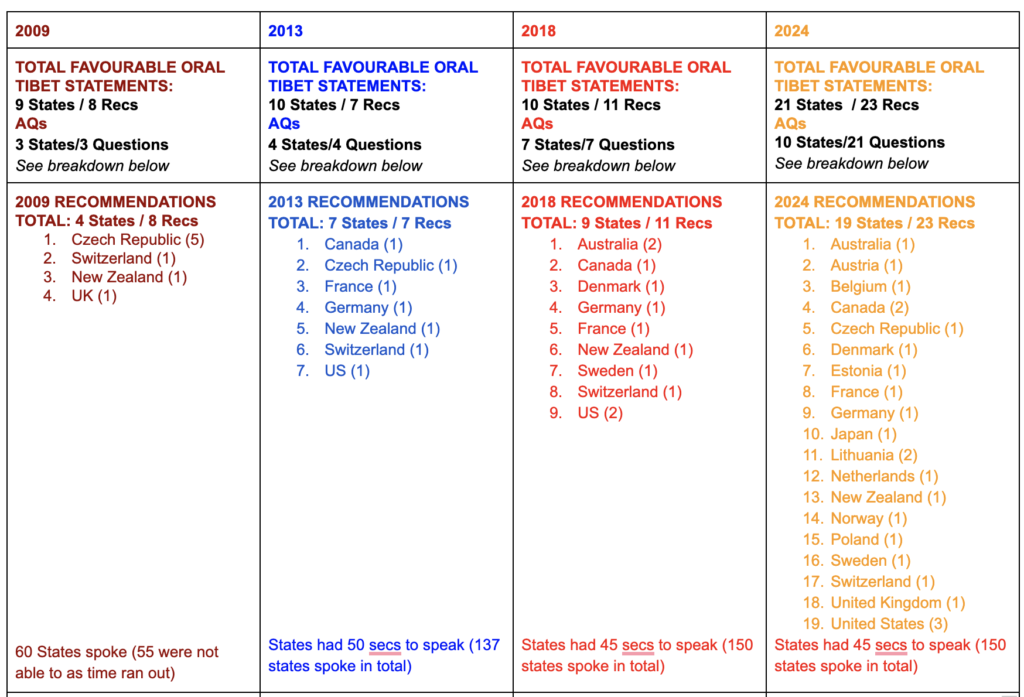
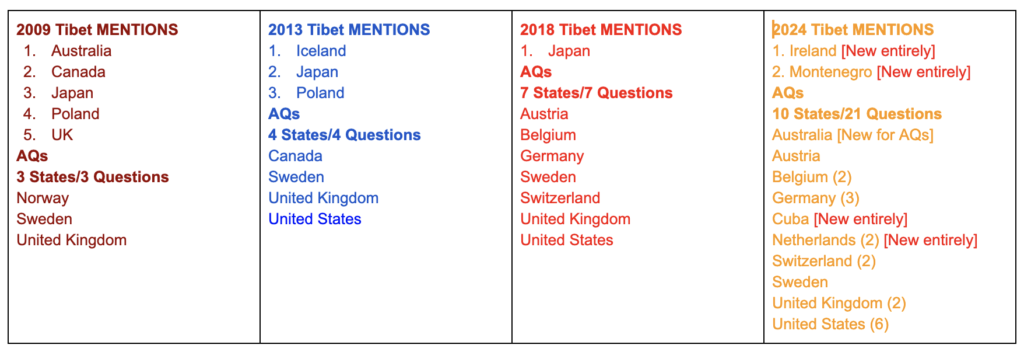
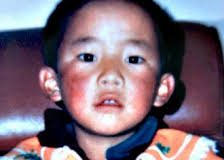
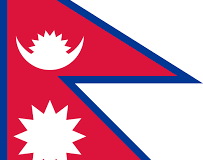

Leave a Comment